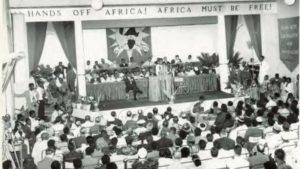Courtesy: Sabrang India
September 28, 2019 was the 112th birth anniversary of freedom fighter and iconic youth leader, Bhagat Singh. On this occasion, a book, ‘The Bhagat Singh Reader’, edited by professor Chaman Lal, was released at the Jawaharlal Nehru University on September 25. Professor Romila Thapar, professor emeritus of the university, sent this message for the programme:
Bhagat Singh has a very special place in our lives, reflecting as he does, a significant aspect of our anti-colonial movement for independence, a movement that ensured our ceasing to be a colony and becoming an independent nation. It was a movement that saw an intense concern with debating and discussing the meaning of nationalism, as well as the methods of attaining freedom from an oppressive government. To this debate Bhagat Singh made his own contribution. He was part of a large number of others, equally effective nationalists, committed to creating a recognizably secular democratic state under the leadership of Gandhi and Nehru.
We applaud Bhagat Singh today, not only for being a nationalist but also, and sometimes more so, for being a person who read widely, reflected on what he had read, and then worked out his ideas on how we might create the nation that we aspired to be. This was not exceptional. This was normal in those days not only to those who spoke about nationalism and the state, but who were directly involved in the making of such a state. Having decided on a democratic state they also discussed what was inherent to democracy. In this secularism had a major role.
The definition of secularism did not stop with just proclaiming the co-existence of all religions. It went much further. It was seen as an essential component of democratic functioning. Today this debate is marginal in the public space and seems not to reach those crafting the state.
Nationalism was not intended to cease once the nation-state had come into being. What is equally crucial is that the emerging state be one that ensures and protects the basic rights of every citizen. This meant establishing the equal status of every citizen, not just in law but in practice as well. In the last seventy years, we have succeeded in establishing an acknowledged independent state, after having been a colony.
We have still to become the secular democratic state that is universally recognized as such, and one that ensures the guarantee of human rights for all its citizens. Had Bhagat Singh lived he would have had a stellar role in making this a reality.
* * *
The editor of the book, Chaman Lal, in his comments, made a reading of two letters of Bhagat Singh.
Message to the Punjab Students Conference, 19 October 1929
Bhagat Singh sent a message for the Punjab Students Conference, which was held on 19 October 1929 at Lahore with Netaji Subhas Bose as the chair. This letter was read out in the conference and was later published in ‘The Tribune’ on 22 October 1929.
Comrades,
Today, we cannot ask the youth to take to pistols and bombs. Today, students are confronted with a far more important assignment. In the coming Lahore Session the Congress is to give call for a fierce fight for the independence of the country. The youth will have to bear a great burden in this difficult time in the history of the nation. It is true that students have faced death at the forward positions of the struggle for independence. Will they hesitate this time in proving their same staunchness and self-confidence? The youth will have to spread this revolutionary message to the far corner of the country. They have to awaken crores of slum-dwellers of the industrial areas and villagers living in worn-out cottages, so that we will be independent and the exploitation of man by man will become impossibility. Punjab is considered politically backward even otherwise. This is also the responsibility of the youth. Taking inspiration from the martyr YatindraNath Das and with boundless reverence for the country, they must prove that they can fight with steadfast resolve in this struggle for independence.
Letter to the Editor, Modern Review, 22 December 1929
Ramanand Chatterjee, editor of the ‘Modern Review’, ridiculed the slogan of ‘Long Live Revolution’ in one of his editorials. Bhagat Singh wrote a reply to the note and handed it over to the trying magistrate to be sent to the ‘Modern Review’. The reply was subsequently published in ‘The Tribune’ on 24 December 1929.
Ramanand Chatterjee wrote the following in his editorial:
According to a free press message, at a meeting of the Naujawan Sabha (Youth League) of Gujranwala in the Punjab, a resolution was passed protesting against the arrest of students on the ground of their shouting “Long Live Revolution” and “Down with Imperialism”, before the Court of the Special Magistrate of Lahore. The resolution states they everyone has the right to utter these cries. It is difficult for laymen to say what cries are or are not legal, when even High Court judges have differed in their interpretation of the law of sedition. But young enthusiasts will pardon an old cynical journalist for confessing that the cry of “Long Live Revolution” has sometimes appeared to him to be a bit funny. A revolution may now and then have been a necessity in the world history, and we should personally like an early non-violent social, economic and political revolution in India. But, what is the exact meaning of “Long Live Revolution”? To be at work is a sign of life. When a desire is expressed for revolution to live long, is it desired that the revolutionary process should be at work every hour, day, week, month and year of our lives? In other words, are we to have a revolution as often as possible? Such ceaseless revolution may make for change, but scarcely for progress, improvement and enlightenment. What one revolution offered must have time to settle down and take root and bear fruit. A ceaseless revolutionary process would make India like what James Russel Lowell called “the Catherine-while republics of South America”, of his day. No doubt, no revolution can produce a final state of improvement; there must be changes even after a revolution. But these should be brought about by evolution. There may again be a revolution after several generations, if not centuries, have passed. But that is not what is implied in the shout “Long Live Revolution”.
Bhagat Singh wrote the following reply:
To, The Editor, Modern Review
You have, in the December (1929) issue of your esteemed magazine, written a note under the caption “Long Live Revolution”, and have pointed out the meaninglessness of this phrase. It would be impertinent on our part to try to refute or contradict the statement of such an old, experienced and renowned journalist as your noble self, for whom every enlightened India has profound admiration. Still we feel it our duty to explain what we desire to convey by the said phrase, as in a way it fell to our lot to give these “cries” a publicity in this country at this stage.
We are not the originators of this cry. The same cry had been used in Russian revolutionary movements. Upton Sinclair, the well-known socialist writer, has, in his recent novels “Boston” and “Oil”, used this cry through some of the anarchist revolutionary characters. The phrase never means that the sanguinary strife should ever continue, or that nothing should ever be stationary even for a short while. By long usage this cry achieves a significance which may not be quite justifiable from the grammatical or the etymological point of view, but nevertheless we cannot abstract from that the association of ideas connected with that. All such shouts denote a general sense which is partly acquired and partly inherent in them. For instance, when we shout “Long Live Jatin Das”, we cannot and do not mean by that shout is that the noble ideal of his life, the indomitable spirit which enabled that great martyr to bear such untold suffering and to make the extreme sacrifice for that ideal, should ever live. By raising this cry we wish that we may show the same unfailing courage in pursuance of our ideal. It is that spirit that we allude to.
Similarly, one should not interpret the word “revolution” in its literal sense. Various meanings and significances are attributed to this word attributed to this word, according to the interests of those who use or misuse it. For the established agencies of exploitation it conjures up a feeling of blood-stained horror. To the revolutionaries it is a sacred phrase. We tried to clear in our statement before the Sessions Judge, Delhi, in our trial in the Assembly Bomb Case, what we mean by the word “Revolution”.
We started therein that Revolution did not necessarily involve sanguinary strife. It was not a cult of bomb and pistol. They may sometimes be mere means for its achievement. No doubt they play a prominent part in some movements, but they do not—for that very reason—become one and the same thing. A rebellion is not a revolution. It may ultimately lead to that end.
The sense, in which the word ‘Revolution’ is used in that phrase, is the spirit, the longing for a change for the better. The people generally get accustomed to the established order of things and begin to tremble at the very idea of a change. It is this lethargical spirit that needs be replaced by the revolutionary spirit. Otherwise degeneration gains the upper hand and the whole humanity is led astray by the reactionary forces. Such a state of affairs leads to stagnation and paralysis in human progress. The spirit of Revolution should always permeate the soul of humanity, so that the reactionary forces may not accumulate (strength) to check its eternal onward march. Old order should change, always and ever, yielding place to new, so that one “good” order may not corrupt the world. It is in this sense that we raise the shout “Long Live Revolution.”
Yours sincerely
(Sd.) Bhagat Singh, B.K. Dutt



